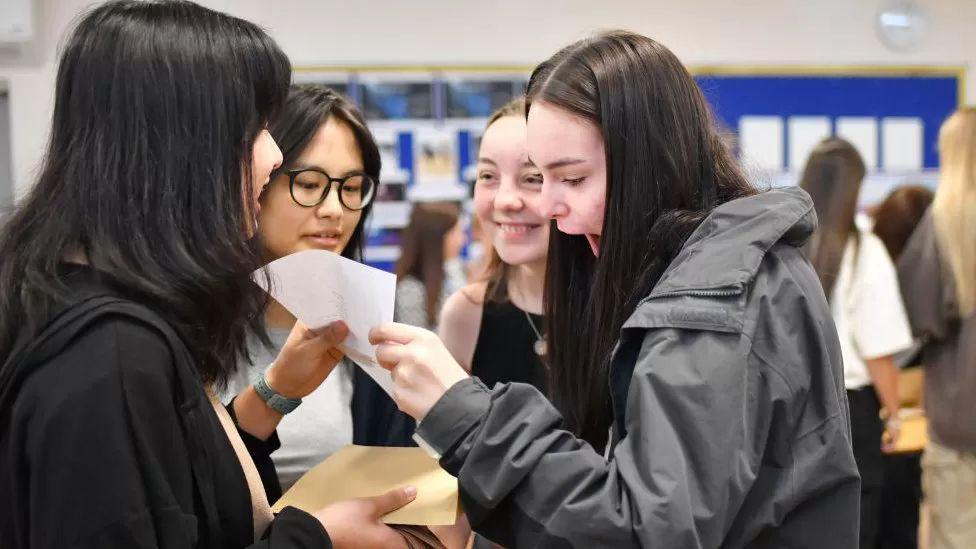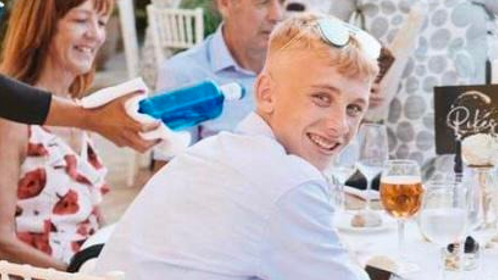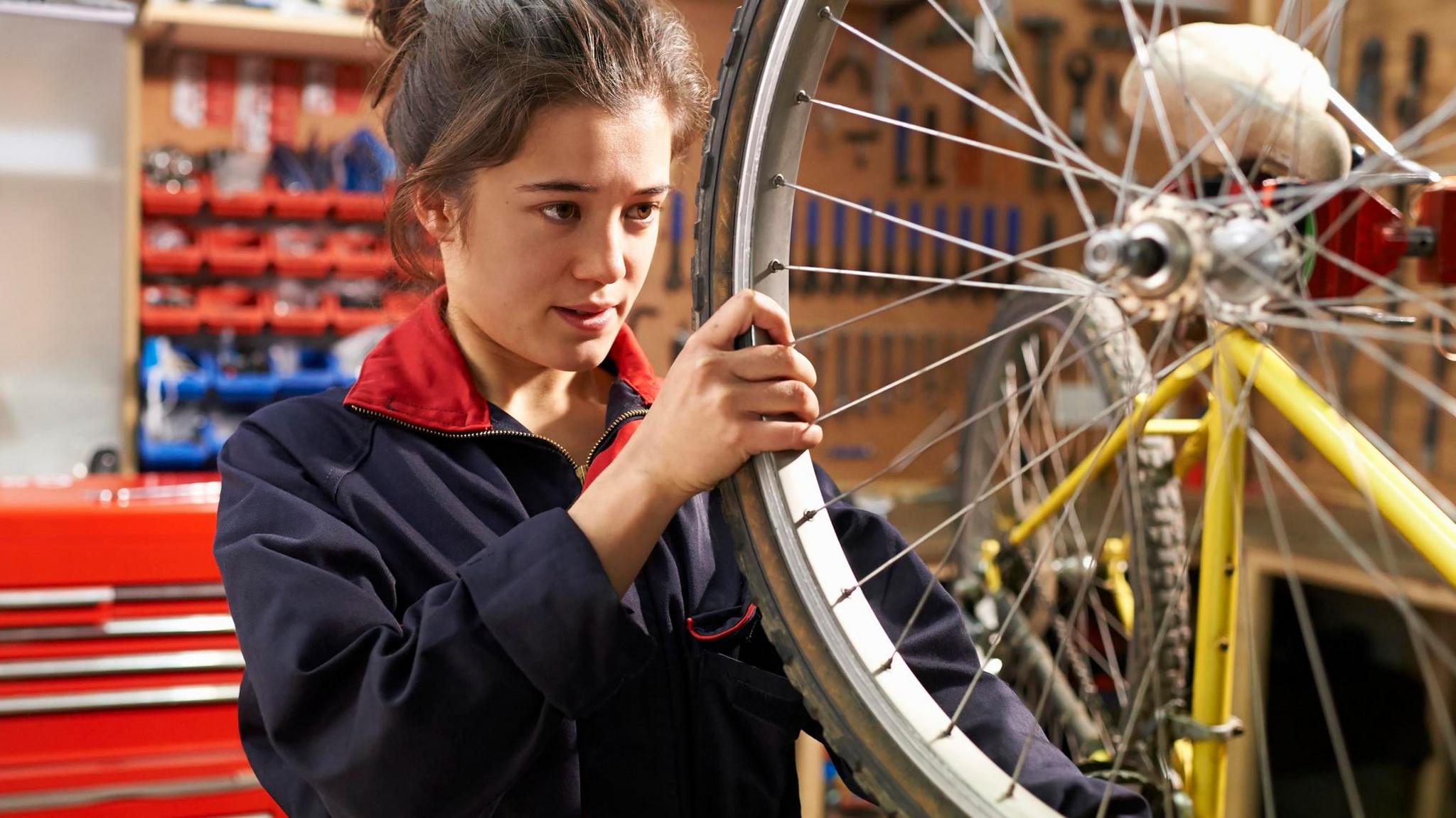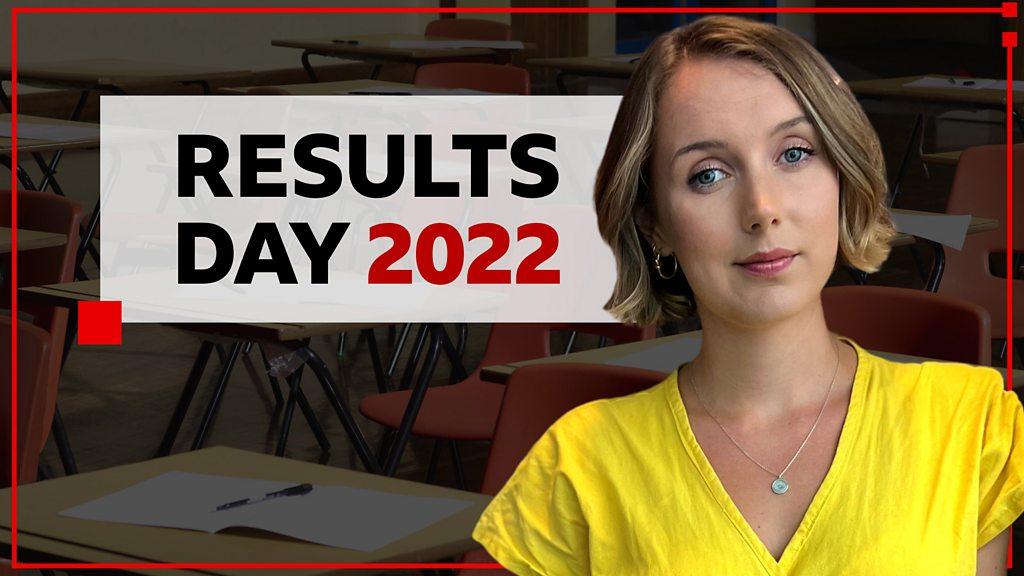'University isn't the only option out there'

A-level results come out in England, Wales and Northern Ireland today
- Published
Deciding what to do with your life at the age of 18 is daunting, with multiple pathways to choose from, including getting a degree, taking up an apprenticeship or going straight into paid work.
University remains a popular choice, with figures from admissions service Ucas released earlier this year showing more than 316,000 UK teenagers have applied for higher education courses this year - the second highest number of applicants on record.
But some people choose not to follow their peers to university. Georgie Winton is one of them.

Georgie Winton will be collecting her results today
The 18-year-old, from Calne in Wiltshire, secured her "dream job" earlier this year, months before sitting her A-level exams.
At a careers fair in November, Ms Winton met staff from Deceuninck, a company that provides PVC for windows.
"I was explaining how much I loved marketing and [the HR manager] said they were looking for somebody to cover on maternity leave," she said.
Ms Winton discussed the vacancy with her head of year and tutor, who both agreed that it would be "stupid" to miss the opportunity.
'University not for me'
"I was set on going to university, but then all of a sudden there was this change," she said.
"I didn't ever really like school, so I thought maybe university wasn't for me.
"I really didn't want to go back into that school-type environment."
Six weeks after the career fair, Ms Winton received a job offer. Her teachers created a reduced timetable so she could still work towards getting her A-levels while starting paid work.
"The stress definitely got to me quite a bit towards the end, especially during exam time," she said.
"That was the most nerve-wracking part because I was thinking have I done the right thing, balancing a job and studying? But I feel like I have," she said.
“Marketing is my dream job and I never thought that I’d be able to do it at the same time as school.”
Ms Winton believes that going straight into work has been "100% better" for her than spending years getting a degree.
“I know a lot of people who have gone to uni, come out with degrees and then they’re stuck in the same boat trying to get jobs like the rest of us," she said.
"My manager said they picked me for the experience I came in with. I’ve worked with multiple local companies doing volunteer work, doing leaflets, logos, anything I could do really [but] I didn’t have any marketing degree or qualification."
Ms Winton added that getting a good job without a degree is "definitely possible" and encouraged students to speak to careers advisors at school.
"Your mind can change, but it’s about the way that you handle that.
"It’s really important that you choose what is going to make you happy."

Luisa Spence dropped out of university
Luisa Spence, from Bishopston, Bristol, completed her A-levels two years ago and then began a textiles course at university despite admitting she felt "apprehensive" about carrying on into further education.
"Everyone in my family has been to university, so it was kind of like the given thing. A lot of my friends were all going as well," she said.
She added that there was "such a focus" on Ucas applications when she was at school, but not much discussion about non-university options.
"I kind of knew deep down that I probably shouldn’t have been going to university - but it seemed like an easy option," Ms Spence added.
'I'm learning practical skills'
The following March, Ms Spence realised the textiles course was not right for her, and left university.
“I felt like I couldn’t pay £9,000 for a course that wasn’t right," she said.
"It didn’t feel like a good use of money."
Ms Spence's plan had always been to go into hairdressing after getting a degree related to fashion or textiles.
After returning home to Bristol and working in retail for a few months, she applied to a Level 2 hairdressing apprenticeship, and has been on the course since February.
"It's going really well," she said.
"It's physically exhausting being on my feet all day, but I definitely prefer this style of learning. It's all practical - I prefer practical learning to continuous writing and exams."
She added: “I feel like apprenticeships prepare you for the job and obviously you’re getting money alongside learning.
"I’m not losing anything; there’s no debt.
"Even if I do decide to not use [the qualification], it’s not a loss."
'Think about it'
"I do regret going to uni, but I can’t dwell too much," she said.
"I feel like if I hadn’t have gone though then it probably wouldn’t have made me do what I actually want to do."
She also added that the money she owes for her short time at university is a burden.
"If this is how much it's cost me now then I dread to think what it would've been in three or four years.
"Quite a lot of people stay at uni doing something they don't want to do. If you can do it for a little while and decide it isn’t right for you then stop as soon as you can.
"There’s no point trying to keep pushing it. I feel like that’s what I did and it didn’t really work out.
"You really need to think about it and get different perspectives as well," she added.

Jake Davies is now a sales consultant
Jake Davies, from Southmead, Bristol, admits he "didn't really know" what he wanted to do after school.
“There weren’t really many options presented at school other than uni [but] It’s what the majority of people do," the 20-year-old said.
He decided to apply "last minute" to do a football coaching degree because he had nothing planned, but dropped out after a few months because it "wasn't very enjoyable".
Mr Davies spent time applying for multiple jobs, often being rejected towards the end of the recruitment process.
'I'd rather be working'
He found employment in a warehouse and as a delivery driver, before securing his current role as a sales consultant.
“All my mates were mainly going to university. I didn’t really want to go - I’d rather be working and making money instead," he said.
“I’ve been fortunate to be able to get a job.
“It’s different for everyone, but you don’t necessarily need a degree. Just get as much experience as you can.
"I did three or four months knocking on doors selling wifi and broadband - it was awful pay and it wasn’t great at all - but without that, I wouldn’t be in the job I’m in today because I wouldn’t have had half the experience to talk about in my interview," he added.
Get in touch
Tell us which stories we should cover in Bristol
Follow BBC Bristol on Facebook, external, X, external and Instagram, external. Send your story ideas to us on email or via WhatsApp on 0800 313 4630.
Related topics
- Published2 October

- Published18 August 2022

